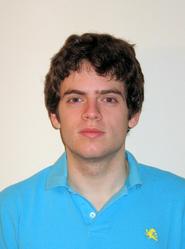
Stephen Okin '10 (New York, N.Y.) is fascinated with current foreign policy, a fascination which led him straight to the big problems. The U.S. relies upon a rhetoric of liberty and democracy, but there are times when the promotion of democracy abroad conflicts with the need to secure national interests. Okin, a rising sophomore, has an Emerson grant and is working with Assistant Professor of Government Ted Lehmann to research this contradiction as regards the "Venezuelan threat:" the current political situation in Venezuela and its conflicting implications for U.S. foreign policy.
For Okin, Venezuela under president Hugo Chavez is an excellent illustration of this foreign policy puzzle. Chavez, a colorful soldier-politician elected in 1998 and reelected in 2006, is "doing a lot against democracy," including press censoring and an attempt to change the constitution. His anti-U.S. stance and position as a democratically-elected leader make Chavez's Venezuela particularly tricky. "At what point," Okin asked in his proposal, "does promoting democracy become less important than securing national interests?"
On beginning his research, Okin's familiarity with Venezuela was limited to the publicized antipathy between Bush and Venezuelan president Hugo Chavez and the disquieting knowledge that the U.S. imports 10% of their oil from an increasingly hostile Venezuela. "I knew it was a hot-button issue," Okin explained. "I started poking around a bit – it's a really, really interesting country."
Okin has, over the course of his research, changed his view of Chavez. Although the U.S. media often presents the president as a threat, he is extremely popular in his own country, where he has, according to Okin, genuinely improved the lives of Venezuelans by improving education, healthcare and the economy. "He's done a lot of things that we [the U.S. under the Clinton administration] couldn't get done in the region." At the same time, however, Chavez is "flawed in certain aspects," said Okin.
Okin outlines his work this summer as an effort to understand "how we got to where we are today" in Venezuela, and how to deal with the situation. He hopes to finish his project with a recommendation for the region, to the tune of a 40 page research paper.
Although he has experience as an intern, Okin is new to summer research, and is enjoying himself. "I thought, wow," he said as he explained why he chose to apply for an Emerson. "I knew it was for me."
Politics are an appropriate research topic for Okin, who is the president of the Class of 2010 and makes student government his top priority. He is also a musician and a member of the Delta Phi Fraternity. Asked for last words, he strongly encouraged applying for the Emerson and Levitt research grants. "It's certainly worth doing."
Okin's research this summer is funded by the Emerson Foundation Grant Program, which provides students with significant opportunities to work collaboratively with faculty mentors, researching an area of mutual interest. Recipients typically undertake some combination of fieldwork, laboratory investigation, library research and the development of teaching materials. A public presentation of their findings is required of all Emerson Scholars during the academic year. .
-- by Lisbeth Redfield
For Okin, Venezuela under president Hugo Chavez is an excellent illustration of this foreign policy puzzle. Chavez, a colorful soldier-politician elected in 1998 and reelected in 2006, is "doing a lot against democracy," including press censoring and an attempt to change the constitution. His anti-U.S. stance and position as a democratically-elected leader make Chavez's Venezuela particularly tricky. "At what point," Okin asked in his proposal, "does promoting democracy become less important than securing national interests?"
On beginning his research, Okin's familiarity with Venezuela was limited to the publicized antipathy between Bush and Venezuelan president Hugo Chavez and the disquieting knowledge that the U.S. imports 10% of their oil from an increasingly hostile Venezuela. "I knew it was a hot-button issue," Okin explained. "I started poking around a bit – it's a really, really interesting country."
Okin has, over the course of his research, changed his view of Chavez. Although the U.S. media often presents the president as a threat, he is extremely popular in his own country, where he has, according to Okin, genuinely improved the lives of Venezuelans by improving education, healthcare and the economy. "He's done a lot of things that we [the U.S. under the Clinton administration] couldn't get done in the region." At the same time, however, Chavez is "flawed in certain aspects," said Okin.
Okin outlines his work this summer as an effort to understand "how we got to where we are today" in Venezuela, and how to deal with the situation. He hopes to finish his project with a recommendation for the region, to the tune of a 40 page research paper.
Although he has experience as an intern, Okin is new to summer research, and is enjoying himself. "I thought, wow," he said as he explained why he chose to apply for an Emerson. "I knew it was for me."
Politics are an appropriate research topic for Okin, who is the president of the Class of 2010 and makes student government his top priority. He is also a musician and a member of the Delta Phi Fraternity. Asked for last words, he strongly encouraged applying for the Emerson and Levitt research grants. "It's certainly worth doing."
Okin's research this summer is funded by the Emerson Foundation Grant Program, which provides students with significant opportunities to work collaboratively with faculty mentors, researching an area of mutual interest. Recipients typically undertake some combination of fieldwork, laboratory investigation, library research and the development of teaching materials. A public presentation of their findings is required of all Emerson Scholars during the academic year. .
-- by Lisbeth Redfield
